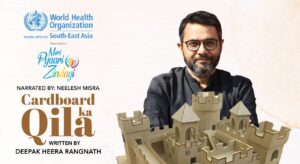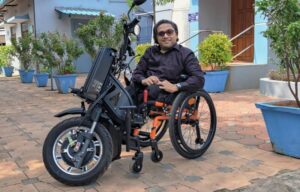The struggle for medical facilities at a time when life itself is battling a fatal health condition and the finances are in shambles is a painful experience etched deep in the memory of 27-year-old Sandeep Kumar.
Sandeep, a cancer survivor who runs ‘DigiSwasthya’ telemedicine centre, had developed Ewing’s sarcoma (a type of bone cancer) at the age of 12. His father, a farmer with limited means, ran from pillar to post to get him treated.
“It was a tough time for me. What I felt in those days has been at the foundation of my psyche ever since,” the cancer survivor told Gaon Connection. “I don’t want any poor, underprivileged person to suffer due to lack of medical supervision. Hence, I started the ‘DigiSwasthya’ telemedicine centre,” he said.
A resident of Kathaicha village in Uttar Pradesh’s Sant Kabir Nagar district — situated almost 235 kilometres from state capital Lucknow, Kumar has been running a telemedicine centre in Sant Kabir Nagar’s Khalilabad since July 8, last year.
DigiSwasthya helps link up doctors with villagers in remote locations and has proved to be a life-saving service in the COVID pandemic as the virus has spread deep into rural areas.
“So far I have helped almost 500 patients from the nearby areas. More than 70 cases of COVID19 have also approached us for medical counselling,” Sandeep told Gaon Connection. He has completed a certificate course on professional oncological caregiving at the Mumbai-based Tata Institute of Social Sciences (TISS).
Apart from general patients and corona infected persons, over 21 cancer patients have also benefited from the medical advice offered by doctors who volunteer for DigiSwasthya.
A personal journey defines a professional move
Remembering the tough days of his childhood, Sandeep said:
“My diagnosis of cancer took a lot of time, we wandered from one doctor to another but none could correctly diagnose the issue.”
Also Read: Graves by the Ganga: a surge of COVID deaths and moneyless families burying, not cremating their kin
Finally Sandeep was diagnosed with cancer in his right arm at a hospital in Gorakhpur. “We were told that the arm will have to be amputated and it will cost around one-and-a-half-lakh rupees. My father is a farmer and our financial condition was grim,” the 27-year-old recalled.
“Luckily we could make it to the Tata Memorial Hospital in Mumbai and a year of chemotherapy and bone replacement ensured that I would live a healthy life ever since,” he added.
And it also motivated him to work in the health sector and help poor villagers access healthcare.
Linking medics with patients
Explaining the functioning of the DigiSwasthya telemedicine centre, Sandeep said that he has developed a network of around 30 doctors and medical professionals across the country who volunteer for the initiative and spare out an hour or so a day for counselling and supervising the ailments of patients who approach his telemedicine service which is free of cost.
“People in villages mostly hide their health issues. Deep down they have this fear that treating the disease will be cumbersome and will cost a lot of money. They swallow a pain killer and just continue to go on with their lives,” the founder of DigiSwasthya told Gaon Connection with a perceptible concern in his voice.
“The diseases surface when it’s too late and that claims many lives,” he added.
The telemedicine centre functions in an organised manner. “We maintain an EMR (electronic medical record) of the patients as most of these people hail from rural areas and are very careless with handling physical documents. An EMR helps when the case is referred to a hospital as it gives clarity about the patient’s history,” Sandeep told Gaon Connection.
For patients that need physical examination and cannot be treated by telemedicine service alone, are allotted hospitals in cities. “It is ensured that these hospitals are aided by NGOs and fall under the government welfare schemes such as Ayushman Bharat in order to ensure minimal financial burden on the patient,” he said.
Rural poor access healthcare in the pandemic
Kumar’s altruism has been a glimmer of hope for the people in the nearby areas especially because the medical practitioners are not attending to patients due to the coronavirus scare.
Chandra Prakash Yadav, a 26-year-old resident of the neighbouring Gorakhpur district availed the services of Kumar’s telemedicine centre for his 48-year-old father who had contracted the COVID19 infection during the recently concluded gram panchayat elections in the state.
“My pitaji (father), Parshuram Yadav was down with fever and cough in the second week of April. We couldn’t find a proper doctor in our Chechuapar village (Sahjanwa block) and had to depend on a jhola chhap (rural health practitioner),” Yadav told Gaon Connection.
“Jhola chhap’s treatment worsened my father’s health. His body turned blackish. Luckily we got the contact details of Sandeep’s health centre. He arranged a video call with a doctor and his prescription helped my father a lot. Within two days, his condition improved,” he added
Yadav told Gaon Connection that he is indebted to Kumar for his aid.
“Unki jitni tareef ki jaaye kam hai,” the 26-year-old said. (No amount of praise can be enough for the work done by Sandeep).
According to Sandeep, the importance of timely diagnosis of a disease is exceedingly vital for its treatment. “A lot of lives are lost in rural areas because there is no medical supervision whatsoever,” he rued.
‘Govt apathy hurts, things could be better’
But setting up the telemedicine centre was not an easy task. When Sandeep started his health centre, he approached many government officials to seek help for his initiative, he said.
“When we went to meet the officials to inform them about our work, they didn’t even meet us. No politician, no department official has come out to help us in any way. If the government provides some help, we can help way more people than our present capacity,” he said.
“People have to sell their cattle and even land to raise funds to save the life of their loved ones. No human being deserves this fate. Healthcare should be available to all,” he added.
DigiSwasthya has aligned itself with other charitable organisations like Maharashtra-based V Care Foundation and Medneed that help it by supplying relief material and medical supplies to be distributed amongst the needy.
“The centre was equipped with a nurse and a paramedic till last month but the nurse has been asked to take leave due to paucity of funds. We could not afford her salary,” Sandeep said.
“So far, I have spent my life savings of two-and-a-half-lakh rupees on this centre,” he added.
If you wish to support Sandeep Kumar’s DigiSwasthya telemedicine centre, you can reach him at 9628321299.



















